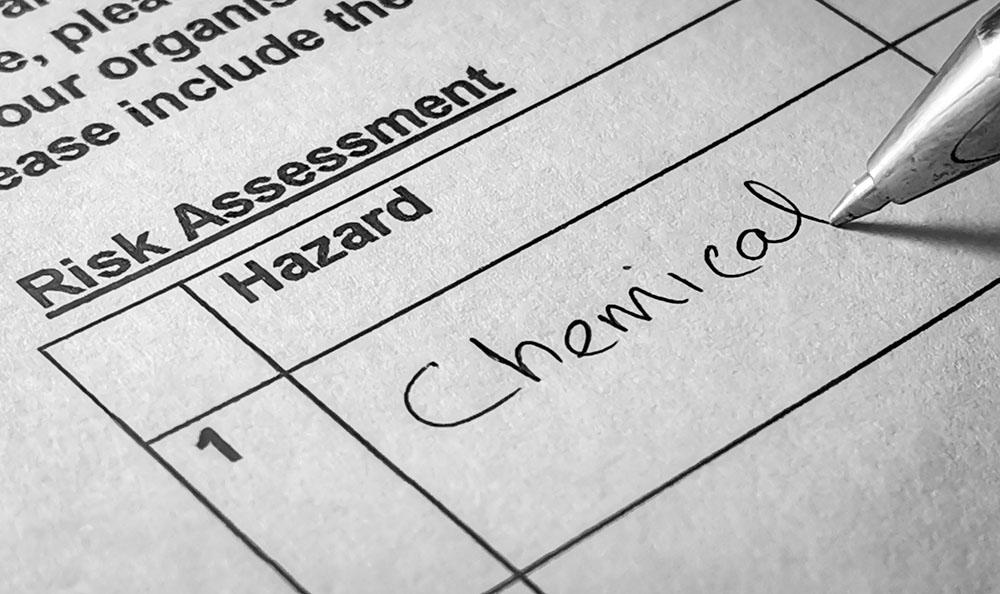The Dangers Of Infrequent Chemical Spill Risk Assessments

CONTENTS
- What is a chemical spill?
- What is a chemical spill risk assessment?
- How often should one be carried out?
- The dangers of infrequent assessments
- What can happen in a chemical spill?
- What should you do in a chemical spill?
- Get in touch
Given how rare chemical spills can be, you may think it unnecessary to perform frequent risk assessments. However, if you work with or supply chemicals in your workplace, you are legally obligated to hold risk assessments often to prevent spills.
At ICE Cleaning, our expert chemical spill cleaners will clean all traces of dangerous chemicals to make the area safe again. They can be on-site within a matter of hours in an emergency and use industry-leading technology to ensure careful decontamination.
Keep reading to learn why you should regularly carry out a risk assessment.
What is a chemical spill?
A chemical spill is the accidental release of a hazardous chemical in the form of either a liquid, solid, or gas. These spills can happen due to poor storage practices, unstable transportation, or the movement between containers.
Spills are separated into two different types – minor and major spills. The type of spill is characterized by the hazardous nature of the chemical, and the size of the spill.
The most common types of spillages you may hear of, or encounter are:
- Ammonia
- Natural Gas
- Hydrochloric Acid
- Chlorine
What is a chemical spill risk assessment?
A risk of spillage in the workplace is a possibility when both humans and machines are working with chemicals. Therefore, you must perform an assessment frequently to identify any hazards and prevent spills or accidents.
A chemical spill risk assessment has specific checks based on the environment, storage, and activities surrounding the chemicals in the workplace. It should include:
- Checking chemical inventory
- Identifying chemical hazards
- Assessing chemical exposure
- Controlling chemical risks
- Ensuring a spill kit is on-site
- Recording and reviewing with workers present
How often should one be carried out?
Although there is no legal time frame for when you should carry out your next assessment, the Health & Safety Executive (HSE) recommends that you should be doing this on an annual basis. You can implement more regular risk assessments if you manage health and safety in your workplace.
Staff and managers should be made aware of the process so that they can identify hazards as soon as possible and act accordingly during an emergency. By providing your staff with health and safety training, you can make your workplace safer.
The dangers of infrequent assessments
By not carrying out a risk assessment regularly, you may have to pay a large fine, and your employees could be in danger. Workplaces that store or handle hazardous chemicals present a high risk of preventable hazards to your staff, potentially exposing them to:
- Skin irritation
- Acid burns and injuries to hands
- Occupational asthma
- Lung diseases
- Cancer
- Death or severe injury
With frequent risk assessments, you will identify hazards early on and prevent a chemical spill from occurring. The workplace is constantly changing, and therefore it is encouraged to perform an assessment often.
What can happen in a chemical spill?
A chemical spill presents severe health risks to your workers, and it could cause damage to the infrastructure of the building. Spillage may result in ignition or combustion, leading to structural weakness in the foundations and support.
After a chemical spillage, your building will be unusable until it is thoroughly cleaned and decontaminated by a chemical spill cleaning company. This is due to the environmental effects that may occur, such as pollution of local wildlife and soil.
What should you do in a chemical spill?
In the event of a chemical spill, it is imperative to raise the alarm and evacuate the area to protect your health. There may be qualified employees on-site who can use a spill kit which contains the tools to slow or halt a spillage.
You should not go near the spill to avoid possible contact, ingestion, or inhalation of toxic gases or acid. Instead, you should call the appropriate emergency services and contact a chemical spill cleaning company.
Injuries can be prevented with a site emergency plan, evacuation protocols, and spill kits. These should be created and implemented during a risk assessment with your employees.
Get in touch
ICE Cleaning is a cleaning company that provides emergency chemical spill clean-up services 365 days a year, 24/7. Our qualified technicians specialise in confined space entry and will dispose of any hazardous waste throughout the decontamination process.
Call us at 0208 066 0360 or email us at enquiries@icecleaning.co.uk to receive a free, no-obligation quote regarding a chemical spill today.

Speak with me today,
I’m here to help
By asking you a few questions either via phone or email I can immediately provide a realistic estimation of the cost.
You’re in good company. We’ve cleaned for the following commercial clients… View all

Why choose us?
- Cater to a wide variety of cleaning situations
- Nationwide coverage, available 24/7
- Cater to commercial and domestic clients
- Free survey provided prior to quotation
- Emergency response team
- Offer a bespoke service designed to suit all your needs
- All technicians hold professional health and safety qualifications, including BICSc, IOSH, Dewpoint Professional & Safe Contractor
We’re fully accredited
We place best practise, professional expertise and health and safety at the core of our business. We’re fully compliant with all legal obligations. You can view a list of our accreditations below, or visit our Health & Safety page for more information.











-RGB-small.1707319151.jpg)




















